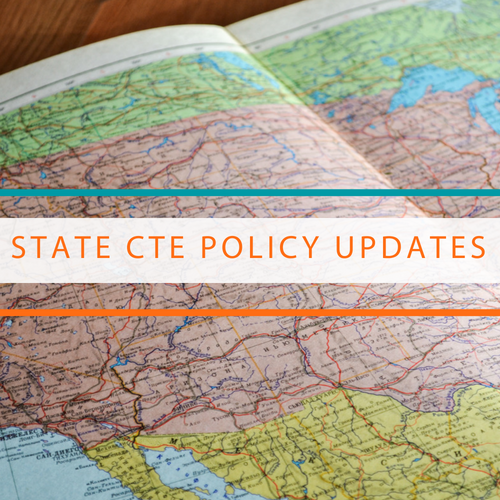 State leaders, particularly state legislators, have a unique role to play in ensuring equitable access to high-quality Career Technical Education (CTE). As the COVID-19 pandemic continues, access and technology gaps have been laid bare, revealing inequities in opportunities for marginalized learner populations. While policies addressing access and equity concerns remained a high priority for legislators in years past, 2021 has been no different; this year to date, almost 30 pieces of state legislation have passed in 17 states addressing this issue. Enacted policies focus on elevating learner voice, examining historically inequitable systems and removing barriers to entry, or providing financial support for historically underrepresented populations. The following policies represent a small sample of equity-focused policies already passed in 2021:
State leaders, particularly state legislators, have a unique role to play in ensuring equitable access to high-quality Career Technical Education (CTE). As the COVID-19 pandemic continues, access and technology gaps have been laid bare, revealing inequities in opportunities for marginalized learner populations. While policies addressing access and equity concerns remained a high priority for legislators in years past, 2021 has been no different; this year to date, almost 30 pieces of state legislation have passed in 17 states addressing this issue. Enacted policies focus on elevating learner voice, examining historically inequitable systems and removing barriers to entry, or providing financial support for historically underrepresented populations. The following policies represent a small sample of equity-focused policies already passed in 2021:
- Colorado SB119 affirms the value of increasing access to industry-recognized credentials for high school students, especially in the wake of COVID-19. The law also requires districts to communicate specific information about work-based learning opportunities and industry-recognized credentials to students and families, and requires the state Department of Education to submit an annual report and communicate similar data to districts.
- Louisiana SB148 creates the M.J. Foster Promise Program, which provides financial assistance up to $3200/year to a low-income learner enrolling in a two-year or shorter postsecondary program in a high-demand, high-wage occupational field aligned with Louisiana’s workforce priorities and leading toward an industry-recognized credential.
- Oregon SB623 directs the State Workforce and Talent Development Board to establish a Committee for Continuous Improvement to conduct an assessment of the Oregon workforce development system. The assessment must incorporate input from historically marginalized groups and other stakeholders and focus on identifying barriers, improving experiences and access to programs, and improving alignment between agencies and nonprofit organizations to ensure individuals impacted most by COVID-19 are prioritized and served.
- Virginia HB1820 expands allowable work activities for Temporary Assistance for Needy Families (TANF) recipients to include participation in educational activities that lead to a postsecondary credential from an accredited higher education institution or other postsecondary school. The credential could include a program resulting in a degree or accredited industry-recognized credential, certification or license.
- Washington SB5194 recognizes the disparate impacts faced by “first-generation college-attending students, students with disabilities, and underrepresented minority students” when applying for or remaining in postsecondary programs, specifically at community and technical colleges. The law announces legislative findings of a need to expand investment in community and technical colleges to guarantee equitable access and requires that all community and technical colleges must submit biennial plans to achieve racial diversity, equity, and inclusion starting July 30, 2022.
Advance CTE’s 2021 Without Limits: A Shared Vision for the Future of Career Technical Education (CTE Without Limits) commits to “All dimensions of equity, including educational, racial, socioeconomic, gender and geographic, and meeting the unique needs of each individual learner,” and promotes many of the same actions connected to these legislative outcomes, including elevating learner voice, supporting equity audits and realigning systems to increase access and funding for marginalized learners. Visit our CTE Without Limits landing page for our call to action and the Learning that Works Resource Center for more access and equity resources.
Dan Hinderliter, Policy Associate
Tags: Colorado, CTE Without Limits, Equity, Louisiana, Oregon, state policy, Virginia, washington

